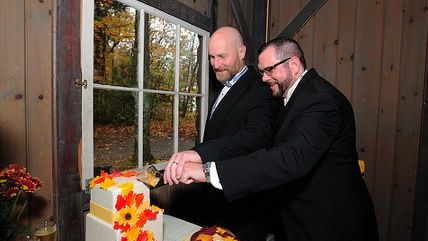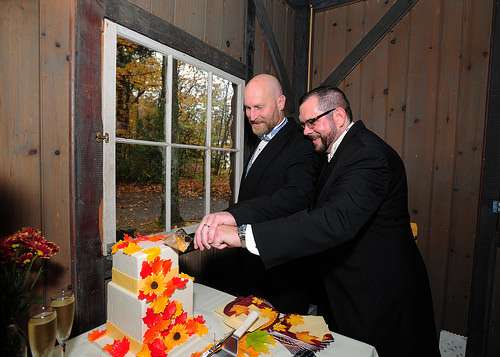Whether a Wedding Cake Is a Right Under Review in Colorado
Can a baker discriminate against gay weddings?


The Supreme Court has not yet decided whether it will take up the case of Elane Photography v. Willock, which asks whether a wedding photographer's personal religious opposition to recognizing same-sex marriage can be used to deny her services to a gay couple.
In the meantime, a similar case has reached the courts in Colorado. An owner of a bakery in Lakewood appeared before a judge, accused of discriminating against a gay couple for refusing to bake them a wedding cake. KDVR in Denver interviewed both sides of the case. Dave Mullins and Charlie Craig, who got legally married in New York, wanted Jack Phillips to make a wedding cake for them in Colorado. Phillips said no:
"Being discriminated against is a form of personal invalidation. It's being degraded and put on a lower level than other people in society," says Mullins about how humiliated he and Craig felt on July 19, 2012, when Phillips of Masterpiece Cakeshop told them his business doesn't make cakes for gay weddings. Phillips says Colorado doesn't recognize same-sex marriages. And also that they're (gay relationships) against his religious beliefs.
"I am a follower of Jesus Christ. So you could say it's a religious belief. I believe the Bible teaches it's not an OK thing," is what Phillips told us last July.
The American Civil Liberties Union says it's illegal for a private retail business open to the public to exclude customers–only private religious groups, like churches, have this right.
"It happened with race discrimination back in the day. It happened with sex discrimination. Over and over the courts say, 'No, your religious beliefs, while important, do not trump discrimination laws," says ACLU attorney Amanda Goad, who flew in from NYC to represent the couple.
But Phillips' lawyer says creating cakes for gays not only violates his freedom of religion, but his freedom of speech.
"Everyone can agree weddings carry a certain message: spiritual, cultural, symbolic … and because it carries a message, under the First Amendment he (Phillips) has the right to say it or not say it," says attorney Nicolle Martin.
Both Jacob Sullum and I have written about these kinds of cases previously. Sullum expressed his disappointment in November that the ACLU has set aside its mission by supporting discrimination laws that actually violate Constitutional protections.
Put me on the record arguing that nobody has a right to force a privately-run bakery to make them a cake, regardless of what the cake says (and, I guess, regardless of what the law says). However, I'm not sure it's a compelling argument that passing along somebody else's speech by writing it on a cake in frosting counts as an endorsement and therefore can violate somebody's free speech rights. There are, though, plenty of cases where a printer has declined to publish magazines or pamphlets or other writings or images that offended them or they found disagreeable.


Show Comments (170)